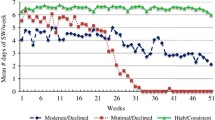Abstract
Background: Although self-monitoring is a central tenet of behavioral approaches to changing health behavior, clinical and public health recommendations for better controlling body weight do not emphasize weight self-monitoring. Purpose: The objective was to determine whether more frequent self-weighing exerts a positive influence on weight loss or weight gain prevention. Methods: This study examined cross-sectional and longitudinal associations between self-weighing frequency and weight in two distinct groups: 1,226 adults who were enrolled in a weight gain prevention trial, and 1,800 adults who were enrolled in a weight loss trial. Results: Although the samples differed significantly in weight and baseline demographic characteristics, the distribution of baseline weighing frequencies did not differ by study. In both groups, more frequent self-weighing at baseline was associated with greater age, lower fat intake, White ethnicity, current nonsmoking status, a greater history of dieting to lose weight, and lower current body mass index. Despite similar weighing instructions, differential patterns of weighing frequency over time were observed: Weight loss dieters increased weighing over time regardless of treatment group (control or intervention), whereas weight gain preventers decreased weighing over time in the control group and increased weighing over time in intervention groups. Most important, higher weighing frequency was associated with greater 24month weight loss or less weight gain. Conclusions: Results support the idea that daily weighing is valuable to individuals trying to lose weight or prevent weight gain. Daily self-weighing should be emphasized in clinical and public health messages about weight control. Experimental studies on the effects of weighing frequency in these contexts are recommended.
Similar content being viewed by others
References
Flegal KM, Carroll MD, Ogden CL, Johnson CL: Prevalence and trends in obesity among US adults, 1999–2000.Journal of the American Medical Association. 2002,288:1723–1727.
Jeffery RW, Drewnowski A, Epstein LH, et al.: Long-term maintenance of weight loss: Current status.Health Psychology. 2000,19(Suppl.):5–16.
Wing RR: Behavioral approaches to the treatment of obesity. In Bray GA, Bouchard C, James WPT (eds),Handbook of Obesity. New York: Marcel Dekker, 1998, 855–878.
United States Department of Agriculture:Nutrition and Your Health: Dietary Guidelines for Americans. Retrieved May 4, 2004 from http://198.102.218.57/dietaryguidelines/dga{dy2000}/ document/frontcover.htm
Centers for Disease Control:Overweight and Obesity. Retrieved May 4, 2004 from http://www.cdc.gov/nccdphp/dnpa/ obesity/
McGuire MT, Wing RR, Klem ML, Hill JO: Behavioral strategies of individuals who have maintained long-term weight losses.Obesity Research. 1999,7:334–341.
McGuire MT, Wing RR, Klem ML, Seagle HM, Hill JO: Long-term maintenance of weight loss: Do people who lose weight through various weight loss methods use different behaviors to maintain their weight?International Journal of Obesity. 1998,22:572–577.
Cooper Z, Fairburn CG: A new cognitive behavioural approach to the treatment of obesity.Behaviour Research and Therapy. 2001,39:499–511.
Cooper Z, Fairburn CG: Cognitive-behavioral treatment of obesity. In Wadden TA, Stunkard AJ (eds),Handbook of Obesity Treatment. New York: Guilford, 2002, 465–479.
Touyz SW, Lennerts W, Freeman RJ, Beumont PJV: To weigh or not to weigh? Frequency of weighing and rate of weight gain in patients with anorexia nervosa.British Journal of Psychiatry. 1990,157:752–754.
Ogden J, Evans C: The problem with weighing: Effects on mood, self-esteem and body image.International Journal of Obesity. 1996,20:272–277.
Ogden J, Whyman C: The effect of repeated weighing on psychological state.European Eating Disorders Review. 1997,5:121–130.
Jeffery RW, French SA: Preventing weight gain in adults: The Pound of Prevention study.American Journal of Public Health. 1999,89:747–751.
Jeffery RW, Sherwood NE, Brelje K, et al.: Mail and phone interventions for weight loss in a managed-care setting: Weigh-to-Be one-year outcomes.International Journal of Obesity. 2003,27:1584–1592.
Block G, Hartman AM, Dresser CM, et al.: A data-based approach to diet questionnaire design and testing.American Journal of Epidemiology. 1986,124:453–469.
Block G, Woods M, Potosky A, Clifford C: Validation of a self-administered diet history questionnaire using multiple diet records.Journal of Clinical Epidemiology. 1990,43:1327–1335.
Thompson F, Byers T: Dietary assessment resource manual.Journal of Nutrition. 1994,124:2296S.
Caan B, Coates A, Schaffer D: Variations in sensitivity, specificity, and predictive value of a dietary fat screener from Block et al.Journal of the American Dietetic Association. 1995,95:564–568.
Paffenbarger R, Wing A, Hyde R: Physical activity as an index of heart attack risk in college alumni.American Journal of Epidemiology. 1978,108:161–175.
Pirie P, Jacobs D, Jeffery R, Hannan P: Distortion in self-reported height and weight data.Journal of the American Dietetic Association. 1981,78:601–606.
SAS Institute:SASOnlineDoc (Version 8). Retrieved May 5, 2003 from http://www.epi.umn.edu/sas8docs/
Cohen J, Cohen P:Applied Multiple Regression/Correlation Analysis for the Behavioral Sciences (2nd Ed.). Hillsdale, NJ: Lawrence Erlbaum Associates, Inc., 1983.
Cohen J:Statistical Power Analysis for the Behavioral Sciences (2nd Ed.). Hillsdale, NJ: Lawrence Erlbaum Associates, Inc., 1988.
Wadden TA, Letizia KA: Predictors of attrition and weight loss in patients treated by moderate and severe calorie restriction. In Wadden TA, VanItallie TB (eds),Treatment of the Seriously Obese Patient. New York: Guilford, 1992, 383–410.
Sherwood NE, Pronk NP, Jeffery RW, et al.: Mail and phone interventions for weight loss in a managed-care setting: Weigh-to-be two-year outcomes [abstract].Annals of Behavioral Medicine. 2004,27(Suppl.):45.
Author information
Authors and Affiliations
Corresponding author
Additional information
This research was supported by National Institute of Diabetes and Digestive and Kidney Diseases Grants 1R01-DK45361 and 1R01-DK53826
About this article
Cite this article
Linde, J.A., Jeffery, R.W., French, S.A. et al. Self-weighing in weight gain prevention and weight loss trials. ann. behav. med. 30, 210–216 (2005). https://doi.org/10.1207/s15324796abm3003_5
Issue Date:
DOI: https://doi.org/10.1207/s15324796abm3003_5




